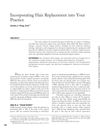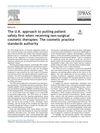 9 citations,
January 2015 in “Current problems in dermatology”
9 citations,
January 2015 in “Current problems in dermatology” Scientists have found specific genes linked to different hair loss conditions, which could lead to new treatments.
 9 citations,
November 2008 in “Facial Plastic Surgery”
9 citations,
November 2008 in “Facial Plastic Surgery” Effective scalp reconstruction requires a wide range of surgical skills and an understanding of hair biology.
 8 citations,
January 2009 in “Journal of pediatric endocrinology & metabolism/Journal of pediatric endocrinology and metabolism”
8 citations,
January 2009 in “Journal of pediatric endocrinology & metabolism/Journal of pediatric endocrinology and metabolism” A specific thyroid hormone resistance mutation may be linked to different types of hair loss.
 8 citations,
July 2021 in “Patient Preference and Adherence”
8 citations,
July 2021 in “Patient Preference and Adherence” Alopecia treatments improve life quality but side effects can lessen this benefit; better use of quality of life measures is needed.
 8 citations,
September 2021 in “Skin appendage disorders”
8 citations,
September 2021 in “Skin appendage disorders” Trichotillomania treatment is most successful with a mix of behavioral therapy, medication, and social support.
 7 citations,
December 2015 in “International Journal of Dermatology”
7 citations,
December 2015 in “International Journal of Dermatology” New and known mutations in the hairless gene cause a hair loss condition called Atrichia with papular lesions.
 6 citations,
November 2021 in “Oncology Research and Treatment”
6 citations,
November 2021 in “Oncology Research and Treatment” Low Vitamin D receptor levels in breast cancer are linked to worse outcomes and more bone metastases, and could be a marker for prognosis.
 6 citations,
July 2017 in “Biochemical and Biophysical Research Communications”
6 citations,
July 2017 in “Biochemical and Biophysical Research Communications” The Hairless gene is crucial for hair cell development, affecting whether skin cells become hair or skin and oil gland cells.
 6 citations,
September 2005 in “Expert Opinion on Pharmacotherapy”
6 citations,
September 2005 in “Expert Opinion on Pharmacotherapy” Androgen therapy can help with symptoms like low libido in women, but more research is needed to understand its long-term safety and effects on health.
 6 citations,
May 2008 in “Current Opinion in Oncology”
6 citations,
May 2008 in “Current Opinion in Oncology” 2007 research improved understanding of prostate cancer risk, diagnosis, and treatment, but also showed the need for personalized treatment and further study on certain therapies' risks.
 6 citations,
September 1998 in “The Journal of The British Menopause Society”
6 citations,
September 1998 in “The Journal of The British Menopause Society” Testosterone replacement may help postmenopausal women with sexual function and bone density, but suitable treatments are limited.
5 citations,
February 2016 in “Hanbang an i bi inhu pibugwa hakoeji/Hanbang an'i'bi'in'hu pibu'gwa haghoeji” Microneedle therapy combined with Hwangryeonhaedoktang solution improved hair growth in mice better than microneedle therapy alone.
 5 citations,
March 2015 in “Clinical and Experimental Dermatology”
5 citations,
March 2015 in “Clinical and Experimental Dermatology” Chemotherapy caused a woman's permanent hair loss and early menopause.
 5 citations,
December 2011 in “Journal of Cosmetic Dermatology”
5 citations,
December 2011 in “Journal of Cosmetic Dermatology” Patients who have hair restoration surgery at different clinics are more likely to experience increased sensitivity after surgery.
 4 citations,
March 2022 in “Dermatology and Therapy”
4 citations,
March 2022 in “Dermatology and Therapy” People with moderate hair loss from Alopecia Areata feel more impacted than those with no or almost complete hair loss, and are more likely to seek treatment.
 4 citations,
January 2015 in “Journal of Mid-life Health”
4 citations,
January 2015 in “Journal of Mid-life Health” The most common skin problems in perimenopausal women in South India are infections, eczemas, and acne, possibly worsened by external factors and lifestyle practices.
3 citations,
January 2013 in “Dermatology” New genetic mutations causing hair loss were found in a Chinese family.
 3 citations,
May 2020 in “bioRxiv (Cold Spring Harbor Laboratory)”
3 citations,
May 2020 in “bioRxiv (Cold Spring Harbor Laboratory)” The unique coat of lykoi cats is likely caused by new variants in the Hairless gene.
 3 citations,
January 2019 in “Jikken doubutsu ihou/Jikken doubutsu/Experimental animals/Jikken Dobutsu”
3 citations,
January 2019 in “Jikken doubutsu ihou/Jikken doubutsu/Experimental animals/Jikken Dobutsu” Pigs without the Hairless gene showed skin and thymus changes, useful for studying human hair disorders.
3 citations,
March 2016 in “Experimental Dermatology” A mutation in the hairless gene speeds up severe itchy skin in mice on a special diet.
 3 citations,
June 2023 in “Journal of dermatological treatment”
3 citations,
June 2023 in “Journal of dermatological treatment” Regrowing scalp hair improves quality of life and reduces anxiety and depression in severe alopecia areata patients.
 3 citations,
November 2008 in “Facial Plastic Surgery”
3 citations,
November 2008 in “Facial Plastic Surgery” Adding hair restoration to a cosmetic surgery practice requires a skilled team and specialized equipment.
 2 citations,
April 2023 in “Pharmaceuticals”
2 citations,
April 2023 in “Pharmaceuticals” Testosterone therapy for postmenopausal women appears safe and may protect against heart disease, but requires constant monitoring and more research for long-term effects.
 2 citations,
January 2023 in “Journal of Education, Health and Sport”
2 citations,
January 2023 in “Journal of Education, Health and Sport” Cognitive-behavioral therapy with habit reversal training is the most effective treatment for trichotillomania.

Women with Polycystic Ovary Syndrome (PCOS) have a lower health-related quality of life, especially those with an anovulatory phenotype, and need specific interventions to improve it.
 1 citations,
September 2023 in “The Journal of urology/The journal of urology”
1 citations,
September 2023 in “The Journal of urology/The journal of urology” Improving symptoms of male urinary problems may lower the risk of death.
 1 citations,
February 2013 in “Clinical pediatrics”
1 citations,
February 2013 in “Clinical pediatrics” The baby’s hair loss was due to a rare genetic condition, not treatable by usual methods.
 1 citations,
September 2023 in “Journal of the American Academy of Dermatology”
1 citations,
September 2023 in “Journal of the American Academy of Dermatology” Baricitinib helps regrow hair and improves quality of life and mental health in severe alopecia areata patients.
 1 citations,
November 2019 in “Actas Dermo-Sifiliográficas”
1 citations,
November 2019 in “Actas Dermo-Sifiliográficas” The Spanish Hair-Specific Skindex-29 questionnaire effectively measures the quality of life impact of hair loss in Spanish-speaking women.
 1 citations,
February 2018 in “Journal of Plastic Reconstructive and Aesthetic Surgery”
1 citations,
February 2018 in “Journal of Plastic Reconstructive and Aesthetic Surgery” The U.K. created the CPSA to set safety standards for non-surgical cosmetic treatments and improve patient protection.



























